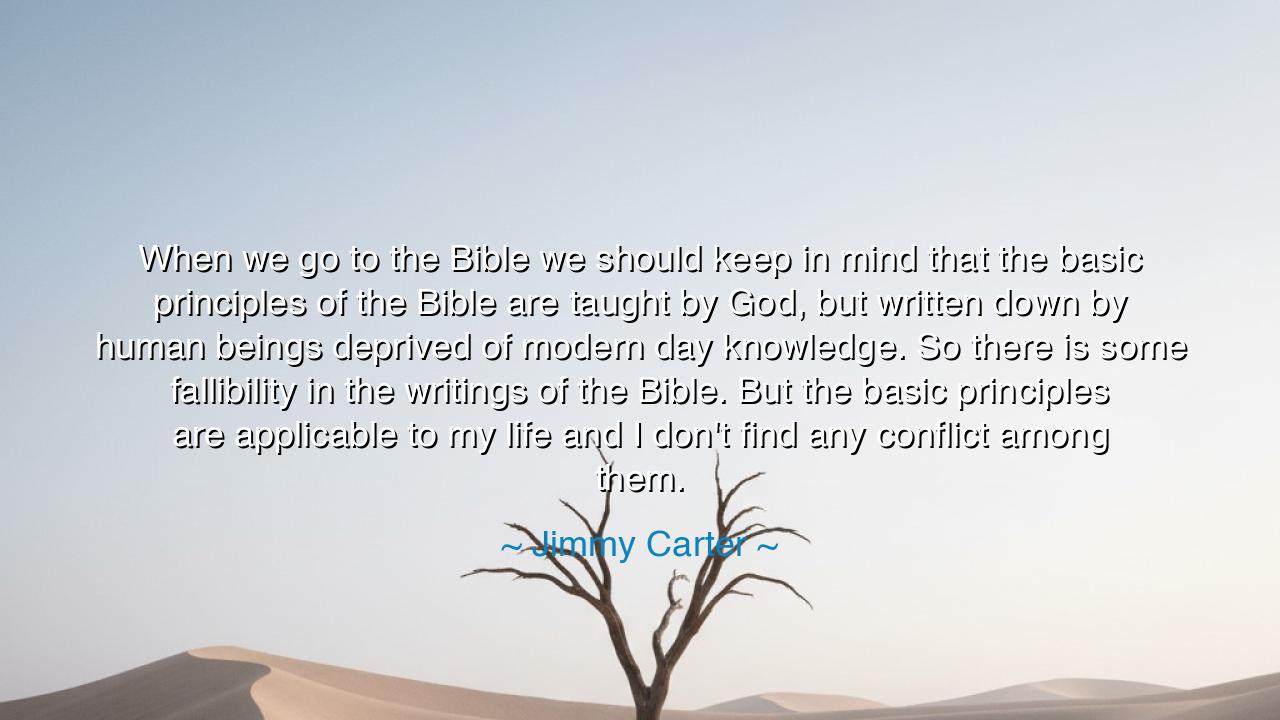
When we go to the Bible we should keep in mind that the basic
When we go to the Bible we should keep in mind that the basic principles of the Bible are taught by God, but written down by human beings deprived of modern day knowledge. So there is some fallibility in the writings of the Bible. But the basic principles are applicable to my life and I don't find any conflict among them.






In the words of Jimmy Carter: “When we go to the Bible we should keep in mind that the basic principles of the Bible are taught by God, but written down by human beings deprived of modern day knowledge. So there is some fallibility in the writings of the Bible. But the basic principles are applicable to my life and I don’t find any conflict among them.” These words carry the weight of humility and discernment. They remind us that the sacred is eternal, but its vessel is human, and humanity, being limited, does not always grasp the fullness of divine truth. Carter, both a man of faith and a man of reason, teaches that one must hold fast to the principles while also recognizing the human hand through which they came.
The ancients too wrestled with this tension. The Stoics taught that the divine law is written not only in scrolls, but in the very order of the cosmos. They believed that truth is eternal, but men’s interpretations are partial, clouded by ignorance, passion, and error. In the same way, Carter’s words remind us that the Bible speaks with divine inspiration, but its words were written by men of their time, bound by the limits of ancient knowledge. Thus, one must not cling blindly to the letter, but seek the spirit that gives life.
Consider the story of Galileo. When he looked to the heavens and saw the planets moving around the sun, his discoveries clashed with certain interpretations of Scripture. Many in his time thought this a contradiction, but Galileo himself declared: “The Bible shows the way to go to heaven, not the way the heavens go.” He recognized what Carter affirms: that the eternal principles of faith—justice, love, humility, and mercy—are not undone by advances in science or by the growth of human knowledge. The apparent conflicts arise from human limitations, not divine truth.
Carter’s words also point us to the essence of faith as lived experience. For him, the principles of the Bible—to love one’s neighbor, to seek peace, to act justly, to walk humbly with God—remain unshaken and fully applicable to life. These are not bound by ancient cosmologies or limited understandings of the natural world. They are eternal lights that continue to guide the soul. In this way, he distinguishes between the fallibility of the human vessel and the infallibility of the divine source.
History also shows us how dangerous it can be when people mistake human interpretation for eternal truth. Wars of religion, persecutions, and divisions have torn apart nations and families when men clung to their own narrow reading of Scripture as if it were beyond question. But the saints and wise teachers of every age have returned again and again to the same insight Carter expresses: that the principles of love, mercy, forgiveness, and justice transcend human error and remain the true foundation of faith.
The lesson is clear: when you open sacred texts, do so with both reverence and humility. Seek the eternal principles that shape the soul, but do not be blinded by the imperfections of human transmission. Embrace knowledge as a gift from God, not as a rival to Him. Let science teach you how the world works, and let Scripture teach you how to live within it with goodness and integrity. For when faith and reason walk together, there is no conflict—only harmony.
Therefore, O listener, engrave this wisdom on your heart: do not stumble over the limits of men, but reach always for the light of God shining through them. Love the Bible not as a flawless artifact, but as a living guide. Hold fast to the principles—love, justice, peace, mercy—and let them shape your life. For as Carter declares, in them there is no conflict, and in them you will find the path not only to faith, but to wisdom that unites heaven and earth.






AAdministratorAdministrator
Welcome, honored guests. Please leave a comment, we will respond soon